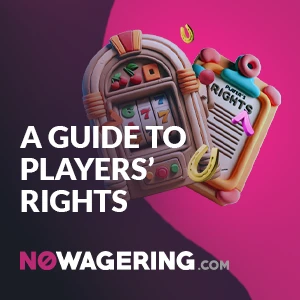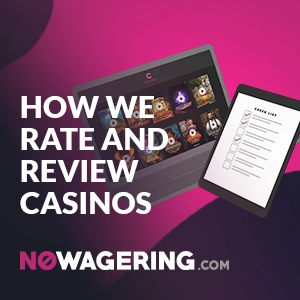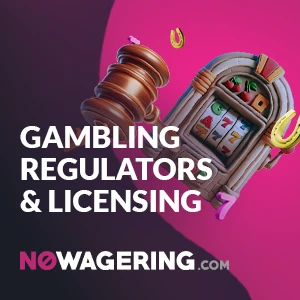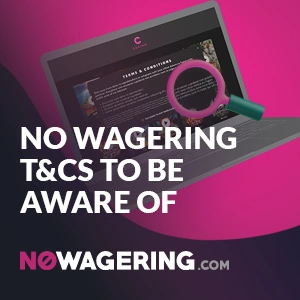Resolving casino disputes: A complete guide

How to resolve a casino dispute
Here at No Wagering, we carefully vet each and every no wagering casino that makes it onto our site to ensure players are only using fair and honest casinos, casinos that have the safety and security of their players in mind above everything else first and foremost.
Unfortunately, with there being so many casinos out there, we can't always promise players that they'll enjoy a smooth, faultless experience as they might do using one of our verified operators. With that in mind we've written this comprehensive guide on how to resolve casino disputes if you're unfortunate enough to find yourself dissatisfied with the service you receive.
How to avoid casino disputes altogether
Before we can even begin to go into detail about how to resolve casino disputes, we should first take a look at how to avoid them altogether. To put it simply, the best way to go about finding a casino that isn't going to put you in any perilous situations such as disputes over withdrawals and winnings is to do your research on them beforehand.
Research each and every casino using trusted review sites
Of course, you could start by reading our very own casino reviews... No Wagering covers an extensive number of trusted casinos with no wagering requirements. If you've checked those out and have come across other casinos that aren't covered on our site then we'd recommend a quick Google search for 'casino reviews' or 'xxxxx casino review' which will bring up several different websites and forums that are dedicated to providing players with true and honest reviews from fellow casino enthusiasts.
It's imperative at this point that we remind you to always read more than one review - while there might be one glowing review of a casino at one site, you cannot base a final decision on that alone, as there could always be several scathing reviews elsewhere.
Once you've gotten a good idea for what the casino has to offer, whether their bonuses are legitimate and whether it's easy to withdraw funds from your account... Then you should go ahead and make that first deposit.
Read the terms and conditions thoroughly
It's all well and good choosing a new casino based on its welcome offer, especially if it's an incredibly generous one offering a huge wad of bonus cash or hundreds of free spins... But in most cases, the more generous the offer, the more restrictive the terms and conditions that come with it.
That's not to say casinos offering a huge number of benefits for new players can't be trusted - fair and honest operators do exist that are willing to go above and beyond, and some conditions are justified to protect the casino from abuse - but it's imperative that you are aware of and understand the terms and conditions in their entirety before jumping in. If anything's unclear, contact support and ask them for clarification.
Even wager-free spins come with conditions of use and can have certain restrictions such as maximum win amounts or maximum bet amounts, although the most common disputes arise from refused winnings as a result of unfulfilled wagering requirements.
There's nothing worse than playing through your spins, winning a huge amount of money and discovering that you can't withdraw it at all. Often disputes can arise due to the fact that the player didn't read the terms and conditions of a much hyped casino bonus that looked more generous than it truly was.
Casino disputes - What should you do first?
Regardless of the nature of your dispute your first port of call should be the casino's customer service team. It's an absolute given that any trusted online casino that's licensed and regulated by a major regulator such as the UK Gambling Commission, Malta Gaming Association or Spelinspektionen will have customer service representatives available 7 days a week and often 24 hours a day.
More often than not these customer service representatives will work tirelessly to ensure a swift and fair resolution to your issue, assuming you've got all the correct information at hand, especially if it's one related to missing funds. We'd always recommend taking multiple screenshots that could help customer services clearly understand and resolve your issue, as well as having all of your key account details to hand.
Ultimately casinos are compliant when it comes to issues as they're incredibly keen to protect their own reputation and of course will wish to continue serving players without attracting unwanted attention for something negative that may have occurred. However, sadly not all issues are as straight forward as a simple conversation with a customer service representative. If you've exhausted all your options having spoken to staff via live chat, telephone and email and you still feel you've been wronged then you may want to take matters further...
Who should you contact if the casino can't resolve the issue?
If you find that the casino is unable to resolve your issue, is unresponsive, or quite simply refuses to resolve it, then unfortunately it's time to contact an Alternative Dispute Resolution (ADR) provider.
ADR providers are external agencies approved by regulators whose purpose it is to step in and resolve disputes between players and casinos. Casinos regulated by the UK Gambling Commission must provide at least one ADR to handle disputes as a condition of their license.
On average it takes around 90 days for an issue to reach a resolution after being picked up by the ADR, however this will differ from case to case depending on the complexity and severity of the dispute. Opening a claim with an ADR is free of charge to the complainant, however there may well be expenses regarding the case further down the line if further information is required.
Which ADR bodies can players call upon for assistance during a dispute?
As mentioned, there are a number of agencies that players that can go to for help, here's the full list of the bodies approved by the UK Gambling Commission:
ADRg Express
One of the UK's oldest dispute resolution providers that deals with online casinos. ADRg Express provide virtual mediation relating to issues up to £15,000 and more.
Contact: [email protected]
Independent Betting Adjudication Service (IBAS)
Founded in 2007 IBAS is a body that's backed by the UK Government and can act as an impartial mediator between the customer and a casino. This entity mainly focuses on sports betting rather than online casinos, however that's not to say they still can't help.
Contact: [email protected]
Bacta ADR Service
This ADR solely specialises in resolving disputes between customers and operators in the gambling industry, so you can rest assured you'd be using an ADR that has a whole lot of experience within the online casino field.
Contact: [email protected]
Independent Panel for Casino and Bingo Arbitration (IPCA)
The Independent Panel for Casino and Bingo Arbitration was founded solely to focus on the Britsh Gambling sector, so if you're a British customer dealing with a British casino then the IPCA could well help in resolving your complaint.
Contact: [email protected]
The final step - Taking a casino dispute to court
The final solution for players that feel they need to resolve an issue that cannot be fairly resolved by an ADR is to take the matter to court. This can be a very expensive and arduous process that should only be considered in extreme cases.
Again, it's highly recommended that players follow all of the above avenues before taking this step. If it is something you're determined to do then it's essential that you're fully aware of your rights and go into the dispute well informed and prepared (All disputes between players and casinos fall under the UK Consumer Rights act, as a financial transaction has taken place).





